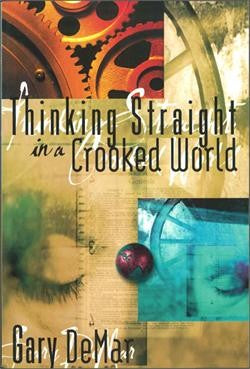In this classic talk given at a Christian home-educators conference, Gary explains why a Christian worldview is so critical and important.
Worldviews are seen as vehicles for cultural transformation. Many in the entertainment field believe, for example, that they are the nation’s conscience and the only guiding light for change. Francis Ford Coppola, best known for the critically acclaimed Godfather trilogy, believes that only artists like himself can bring about a transformed world:
My dream is that the artist class—people who have proven through their work that they are humanists and wish to push for what Aldous Huxley called the desirable human potentialities of intelligence, creativity and friendliness—will seize the instrument of technology and try to take humanity into a period of history in which we can reach for a utopia. Of course, it is possible for the technology to be misused—we could end up with a Big Brother—but we could also have a balanced society, with an artist class leading the culture toward something approximating a happy family or tribe.
At the moment, the nation is in a fog, and we’ve got to put our headlights on. Artists—those who rely on their intuition— can be the nation’s headlights.
An artist’s “intuition” is the presupposed authority for Coppola to bring about this new world. If the film industry is any indication of what we can expect from the artist class, we are in big trouble.
Coppola’s transformational optimism, based on the premise that man—either individually or collectively—is the standard, has been tried before. H. G. Wells, the author of numerous popular science fiction thrillers such as The Time Machine, War of the Worlds, and The Invisible Man, described a period of “evolutionary idealism, faith in progress, and complete optimism.” He proposed that world leaders should create “a common world religion” that was not linked to Christianity or any other theistic religion. This new man-made world religion would derive its power from a new god, a world government run by world statesmen. “Our true State, this state that is already beginning, this state to which every man owes his utmost political effort, must be now this nascent [beginning] Federal World State to which human necessities point. Our true God now is the God of all men. Nationalism as a God must follow the tribal gods to limbo. Our true nationality is mankind.”
But it wasn’t long before his optimism turned to despair. Shortly before his death in 1946, Wells wrote The Mind at the End of Its Tether, an aptly titled book that was filled with numbing hopelessness: “The end of everything we call life is close at hand and cannot be evaded… The writer is convinced that there is no way out or round or through the impasse. It is the end." Wells had nothing to offer. Bound by his atheistic presuppositions, he could only conclude that there is “no compelling argument to convince the reader that he should not be cruel or mean or cowardly.” What would fill the void? Wells did not have an answer. All of his self-appointed gods had failed him.

Thinking Straight in a Crooked World
The nursery rhyme "There Was a Crooked Man" is an appropriate description of how sin affects us and our world. We live in a crooked world of ideas evaluated by crooked people. Left to our crooked nature, we can never fully understand what God has planned for us and His world. God has not left us without a corrective solution. He has given us a reliable reference point in the Bible so we can identify the crookedness and straighten it.
Buy NowIn this classic talk given at a Christian home-educators conference, Gary explains why a Christian worldview is so critical and important. Having all the right answers does not equip Christians to deal with today’s ever-changing world. The enemy never stops reinterpreting and twisting Truth to suit their own sinful desires. Answering their moving target requires a worldview “grid.” This is Part One of Two. Listen to Part Two here.
Click here for today’s episode
You can also download this lecture for free here.

